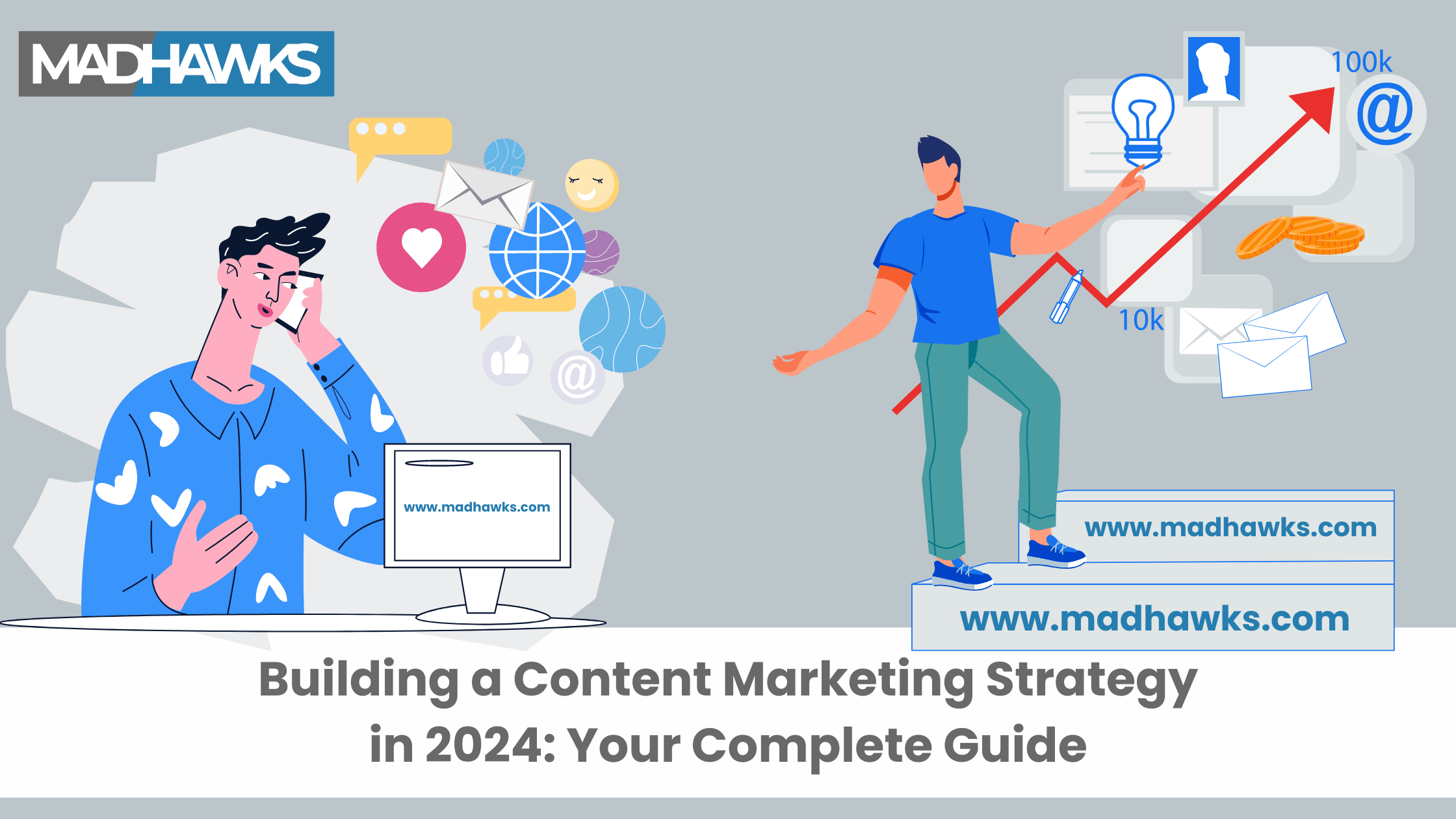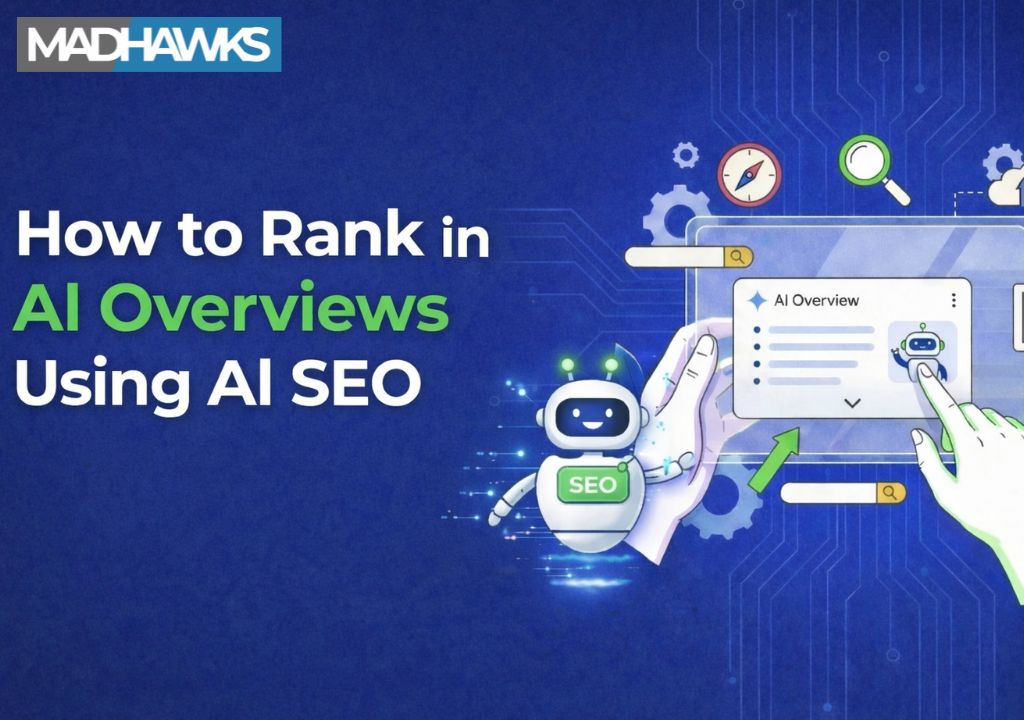You might have heard the phrase ‘Content is King.’ It actually holds true in the digital marketing landscape. Various businesses have been able to boost brand awareness to a great extent because their content strategy was well-planned and aligned with their business goals. An effective content marketing strategy requires you to perform thorough research about your industry, your target audience, and several other aspects. With the right strategy, you can attract thousands or even millions of potential leads while a wrong strategy can just result in the waste of your time and effort. In this blog, we will help you understand what content marketing is, why your brand needs it, and how you can create an effective strategy for your business:
What is Content Marketing?
Content marketing refers to creating and sharing content online that adds value to your target audience. A lot of marketers tend to believe that content marketing is a complex process, but it is actually not that complex. You just need to be very clear about your goals.
Usually, the goal is to attract more potential leads to your business by publishing content in the form of blog posts, social media posts, videos, infographics, or any other format. Apart from attracting new potential customers, content marketing also helps in improving brand awareness and establishing a good brand reputation. Knowledge of the following things will help you build a powerful content marketing strategy:
- Goals or objectives that you want to achieve.
- Who your target audience is? You must know for whom you are creating content.
- The type of content you will be creating and distributing across different channels.
- The strategy you will use to effectively create and share content.
Types of Content Marketing
Different brands use different types of content marketing depending on their goals and their business requirements. Here are some most popular types of content marketing that you can include in your strategy:
1. Online Content Marketing: Online content marketing relates to any content that you publish online on your website. Generally, web pages, articles, landing pages, etc, lie under this category. Web pages with well-written and relevant content can rank high on SERPs (Search Engine Result Pages).
2. Social Media Content Marketing: Any content that you share on social media in the form of text, images, videos, or infographics, is a part of social media content marketing. Different social media platforms, such as Instagram, Facebook, X, Pinterest, etc, provide multiple ways to share content and engage with your audience.
3. Blog Content Marketing: Blogs are one of the best ways to share the content of your choice with your audience while adding relevant links, product information, etc, to it at the same time. By regularly publishing engaging blogs to your website, you can achieve authoritativeness in your industry and also promote your business.
4. Infographic Content Marketing: Infographics allow you to display complex information or data in an easily understandable graphic format. By converting information into infographics, you can make it more interesting and easy to understand for your audience. You can incorporate infographics in your blogs as well as social media posts. Making them publicly available also opens up a great backlinking opportunity for you.
5. Video Content Marketing: As the name implies, video content marketing involves sharing content in the form of videos. As per a study, around 91% of businesses use video content to strengthen their online marketing strategy. You can share the video content on social media or your landing pages to boost customer engagement.
6. Paid Ad Content Marketing: Paid ads can help you gain higher online visibility. You can run paid content ads on social media, SERPs, sponsored posts, landing pages, or several other places where you want to be seen. To attract more leads through paid ads, the content of these ads matters. The more engaging and valuable content.
7. Podcast Content Marketing: As per some experts’ predictions, more than 71 million people will listen to podcasts in 2025. This makes podcast content marketing a great opportunity for emerging businesses to expand their reach. You can start a podcast of your own and share your thoughts on any topic of your choice. Podcast content marketing holds much more potential than we can see in it today.
Importance of Content Marketing for Businesses
Around 29% of businesses are using content marketing in 2024. Content marketing can be very effective in improving brand awareness and helping a business expand its reach. The following points will help you understand the importance and benefits of a well-planned content marketing strategy:
1. Modern Consumers Want To See Informative Content
A study found that around 70% of consumers prefer to read an article to learn about a product or service rather than seeing an ad for it. Even today, over 40% of consumers go through a few pieces of content before they show interest in a brand. This is the reason why many businesses are using content marketing, more specifically websites and blogs, to attract potential customers and boost engagement.
2. Less Expensive Yet Very Effective Method for Lead Generation
Content marketing can generate up to three times more leads than outbound marketing. An even more interesting fact is that it costs around 62% less than outbound marketing. Various B2B as well as B2C marketers believe that content marketing is an effective lead-generation method that costs less and drives more results.
3. Boost Brand Awareness and Build Brand Authority
By sharing engaging and valuable content, you can establish your brand’s image as an expert in your industry. With an effective content marketing strategy, you can make your articles and blogs rank higher on search engines, which further encourages your target audience to see your website as an authoritative source of information. When your content arrives among the top SERP results, users start seeing you as an industry expert, which further improves your brand reputation. This also increases your brand awareness as more people become aware of your brand when your content is visible on SERPs.
How To Create An Effective Content Marketing Strategy
As per a survey conducted by HubSpot, 14% of marketers say that creating content that actually drives more leads is a challenging task for them. This is because not every brand is capable of building an effective content marketing strategy. Here are a few things that you need to keep in mind to ensure that your content strategy works in the favor of your brand:
1. Set SMART Goals
SMART here refers to Specific, Measurable, Achievable, Relevant, and Time-Bound. You first need to have a clear idea of your goals, i.e. what you want to achieve with content marketing. Your whole strategy is going to be based on your goal. So, just make sure that you set it carefully, keeping every important aspect of your business in mind. Your goal can be to establish yourself as an expert in your niche, increase traffic to your website, improve brand awareness by sharing engaging content across multiple channels, or anything else. Just make sure that the objective is relevant to your business and is achievable.
2. Understand Your Target Audience
It’s not a very bad idea to create content for a broad audience instead of targeting a specific segment. But it can be challenging to stand out in such a case. To make your content visible online, it is better to focus on a specific segment of the audience having relevant needs or interests. Even the best-written content might not stand out if it doesn’t target the right audience. To identify your target audience, you can start by finding answers to questions like: what types of solutions is your brand offering? Who all are looking for the solutions you offer? And what type of content do they trust the most?
You can use data analytics techniques and audience research tools to understand the requirements of your target audience. By looking at their demographics, you will be able to reshape the way you create content, your brand’s tone of voice, and other factors that cater to your audience. You can even get insights into their behavior using online tools. It will help you understand which platform they use the most and how they engage with different websites.
3. Choose The Type of Content You Want To Share
Once you have set your goals and understood the interests of your target audience, you can proceed further to decide which type of content you want to share. You can choose one or multiple content types out of blog posts, videos, Ebooks, podcasts, infographics, etc. By looking at your audience’s online behavior and interests, you can decide which type of content will work for your brand. If your goal is to boost online traffic to your website and your target audience is also interested in reading online content, you can proceed further with blog posts. If you want to boost brand awareness and your target audience is more interested in video content, you can create a YouTube channel and start sharing video content there.
4. Find Topics You Want to Cover and Prioritize High Potential Topics
You can find plenty of topic options to write about. But a well-planned strategy is not about writing any random article. You can start by conducting keyword research to find out the most searched queries by your target audience. You won’t be able to attract organic traffic if you don’t target the right keywords. Check factors like search volume, keyword difficulty, etc, for each keyword and pick the best topics that hold ranking potential. Prioritize topics that have high monthly searches as they will help drive more traffic to your website. You can also cover other topics side-by-side but focus more on high-potential ones.
5. Focus on SEO and Other Ways to Promote Your Content
Just creating and publishing content is not enough. Your content marketing strategy should also include a plan for distributing and promoting the content you create. SEO (Search Engine Optimization) is the most important thing to focus on when it comes to content distribution. Without optimizing your content for search engines, you cannot make it visible to your target audience. Search engines follow a specific algorithm to rank web pages and SEO is the best way to ensure that your content aligns with this algorithm.
Some other effective content promotion strategies include social media marketing, email marketing, content syndication, paid advertising, influencer marketing, etc. If your major focus is on website content or blog posts, you can promote them on social media and other channels.
Strengthen Your Content Marketing Strategy With MadHawks
Content marketing can prove to be highly beneficial for your business, provided that you follow a well-planned strategy. It’s crucial to set specific goals, understand your target audience, and create a strategy accordingly. As mentioned above, many brands find it challenging to build a content strategy that drives leads for their business. This is because you need to keep various aspects of your business in mind when creating such strategies. If it seems challenging, you can partner with MadHawks and build a content marketing strategy that just works best for your business. For any further details, contact us today!
Also read this blog:– Polar Bear Tied Up With MadHawks To Run This Impactful Influencer Marketing Campaign







